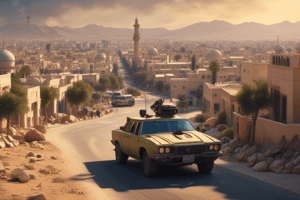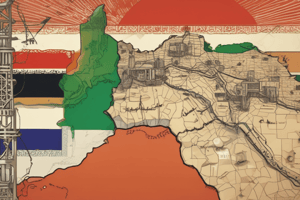Podcast
Questions and Answers
What was a significant outcome of the Iran-Iraq War in terms of regional stability?
What was a significant outcome of the Iran-Iraq War in terms of regional stability?
The Iran-Iraq War exacerbated existing tensions in the region, leading to ongoing conflicts and instability among neighboring nations.
How did the historical grievances between Israel and its neighbors contribute to the wars in the region?
How did the historical grievances between Israel and its neighbors contribute to the wars in the region?
Historical grievances, especially regarding territorial disputes and ideological differences, have fueled multiple wars between Israel and its neighboring countries.
In what ways did the complex political and social issues in the Middle East affect international interventions?
In what ways did the complex political and social issues in the Middle East affect international interventions?
The complexity of political and social issues often made international interventions ineffective and minimal in addressing the conflicts.
What role did external actors play in the conflicts involving Israel?
What role did external actors play in the conflicts involving Israel?
How has oil wealth impacted the geopolitical landscape in the Middle East?
How has oil wealth impacted the geopolitical landscape in the Middle East?
What were the main causes of the Iran-Iraq War?
What were the main causes of the Iran-Iraq War?
What were the consequences of the Iran-Iraq War for both countries?
What were the consequences of the Iran-Iraq War for both countries?
How did the Six-Day War of 1967 alter the geopolitical landscape of the Middle East?
How did the Six-Day War of 1967 alter the geopolitical landscape of the Middle East?
What was the outcome of the Yom Kippur War in 1973?
What was the outcome of the Yom Kippur War in 1973?
What sparked the First Lebanon War in 1982?
What sparked the First Lebanon War in 1982?
What was a significant consequence of the Second Lebanon War in 2006?
What was a significant consequence of the Second Lebanon War in 2006?
What are some of the factors that lead to conflicts between Israel and its neighboring countries?
What are some of the factors that lead to conflicts between Israel and its neighboring countries?
How do regional powers like Iran and Saudi Arabia influence Middle Eastern conflicts?
How do regional powers like Iran and Saudi Arabia influence Middle Eastern conflicts?
Flashcards
Iran-Iraq War cause
Iran-Iraq War cause
Territorial disputes, ideological differences, and power ambitions.
Six-Day War outcome
Six-Day War outcome
Israel gained control of the West Bank, Gaza Strip, Sinai, and Golan Heights.
Yom Kippur War significance
Yom Kippur War significance
A surprise attack highlighting regional volatility and testing international standings.
Israeli-Palestinian conflict root
Israeli-Palestinian conflict root
Signup and view all the flashcards
Regional power struggle element
Regional power struggle element
Signup and view all the flashcards
Modern Middle East conflicts
Modern Middle East conflicts
Signup and view all the flashcards
First Lebanon War cause
First Lebanon War cause
Signup and view all the flashcards
Iran-Iraq War impact
Iran-Iraq War impact
Signup and view all the flashcards
Middle East Conflicts
Middle East Conflicts
Signup and view all the flashcards
Proxy Wars
Proxy Wars
Signup and view all the flashcards
Regional Tensions
Regional Tensions
Signup and view all the flashcards
External Actors
External Actors
Signup and view all the flashcards
Historical Grievances
Historical Grievances
Signup and view all the flashcards
Study Notes
Modern Middle East Conflicts
- The modern Middle East is characterized by complex geopolitical dynamics, historical tensions, and ongoing conflicts. These include the Iran-Iraq War, conflicts surrounding Israel, and broader regional power struggles.
- Various historical factors, including religious and ethnic differences, continue to shape contemporary conflicts.
- Oil wealth and strategic importance attract external actors, fueling ongoing global conflict.
- A complicated mix of political and social issues creates a dynamic and unstable environment. The role of international actors and organizations in mediating regional conflicts has been minimal and often unsuccessful.
The Iran-Iraq War (1980-1988)
- Fought between Iran and Iraq.
- Stemmed from territorial disputes, ideological differences, and power ambitions.
- Involved extensive use of conventional weaponry and unconventional warfare tactics.
- Had devastating consequences for both countries, resulting in significant loss of life and immense economic damage.
- Left a lasting impact on the regional political landscape and had international repercussions, greatly influencing relations between the nations involved.
- Long-term implications for the development and status of both countries.
Conflicts Surrounding Israel
- Israel's establishment and subsequent conflicts with its surrounding neighbors have been a defining feature of the regional landscape.
- The Israeli-Palestinian conflict is a central part of the situation.
- Includes numerous wars and periods of tension.
- Roots lie in historical disputes over land ownership and religious claims. The creation and legitimacy of the state of Israel are significant aspects of ongoing debates and conflict.
Israeli Wars (Brief Summary)
- Six-Day War (1967): Israel gained control of the West Bank, Gaza Strip, Sinai Peninsula, and the Golan Heights, significantly altering the geopolitical landscape.
- Yom Kippur War (1973): A surprise attack by Egypt and Syria highlighted the region's volatility, testing international standings and the abilities of different nations.
- First Lebanon War (1982): Fighting between Israel and the PLO, along with other groups within Lebanon's civil war, led to broader involvement and heightened regional tensions.
- Second Lebanon War (2006): Combat between Israel and Hezbollah resulted in significant military clashes.
- Other conflicts: Israel has engaged in numerous smaller conflicts and military actions, with numerous factors causing flare-ups and tensions.
Key Regional Power Struggles:
- The presence and influence of numerous powerful actors (for example, Iran, Saudi Arabia) further complicate regional dynamics.
- These actors often use political maneuvering and proxy wars to exert influence.
Issues with Other Nations
- Tensions exist between numerous other nations in the region due to historical grievances, territorial disputes, and ideological differences.
- These complex issues tend to intertwine, making separation difficult.
Studying That Suits You
Use AI to generate personalized quizzes and flashcards to suit your learning preferences.




